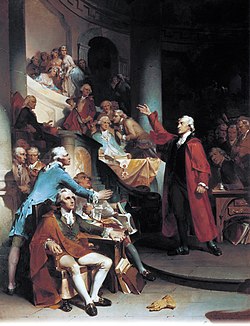
The Virginia Resolves were a series of resolutions passed on May 29, 1765, by the Virginia House of Burgesses in response to the Stamp Act of 1765, which had imposed a tax on the British colonies in North America requiring that material be printed on paper made in London which carried an embossed revenue stamp. The act had been passed by the Parliament of Great Britain to help pay off some of its debt from its various wars, including the French and Indian War fought in part to protect the American colonies.
The resolves claimed that in accordance with long established British law, Virginia was subject to taxation only by a parliamentary assembly to which Virginians themselves elected representatives. Since no colonial representatives were elected to Parliament, the only assembly legally allowed to raise taxes would be the Virginia General Assembly.
Similarly angered, legislatures in nine other colonies later sent delegates to Stamp Act Congress in New York (October 9–25, 1765) to devise a unified protest against the tax. Virginia was not represented at the meeting as the General Assembly was prevented from participating by Lieutenant Governor of Virginia Francis Fauquier.